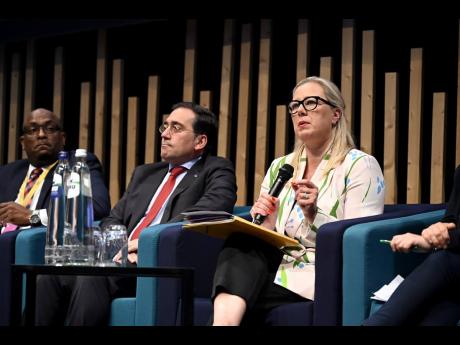EU’s commissioner to place strong emphasis on youth, next-generation issues
BRUSSELS, Belgium:
EUROPEAN COMMISSIONER for International Partnership, Jutta Urpilainen, has made it clear that one of her personal priorities is to guarantee that issues impacting youth and the next generation are not overlooked. These issues, she assured, will be addressed when heads of states and government leaders assemble to discuss the national interests, policies and the state of affairs of their respective nations.
She stated that, as the population of Latin America (LATAM) and the Caribbean continues to grow, it is quite clear that young people represent a large portion of the population of these nations and require greater investment to guarantee a promising future.
Urpilainen, who was speaking at a press briefing with journalists at the EU-Latin America and the Caribbean Forum – Partners in Change: Youth, Civil Society and Local Authorities, which began yesterday, stated that she was on a mission of establishing “people-to-people connections” within the region.
The Inter-American Development Bank (IDB), the European Commission, and the CAF-Development Bank of Latin America jointly organised the forum, which will conclude today. It intended to bring together youths, local authorities, and civil society groups from both continents to have conversations about how the two may work together in the future and develop collaborative solutions to today’s most important problems.
The last time a summit of this kind was held by the EU was eight years ago, which she hopes to change so as to have regular meetings and coordination with the LATAM and the Caribbean region.
According to Urpilainen, since the last meeting, a number of events have taken place in various parts of the world that have necessitated this year’s holding.
In reference to the ongoing Russian-Ukraine war which began in February 2022, the commissioner, who assumed her position in 2019, expressed the view that the EU felt as though it was its obligation to provide support and humanitarian assistance while also realising that there is a global crisis at hand.
“Our partners, including Latin America (LATAM) and the Caribbean region, they really see the ramifications and the consequences of the war in their everyday life in terms of inflation, energy prices, [and] in some parts of the world, food insecurity,” she said.
PARTNERS BY CHOICE
She added that LATAM and the Caribbean have always been “a natural partner” for the EU, given shared history, culture, values and language.
“But, taking into account the world we are living in, we also would like to become the partners of choice,” she added.
This, she said, ties in with the importance of the hosting of the EU Community of Latin American and Caribbean States (EU-CELAC) Summit of Heads of State and Government that will convene on July 17 to 18.
A keen focus will be placed on the EU-LAC Global Gateway Investment Agenda, a political commitment to work together in LATAM and the Caribbean. The Global Gateway, which was adopted 18 months ago by the EU, is a comprehensive investment offer to partner countries to boost smart, clean and secure connections in digital, energy and transport sectors, and to strengthen health, education and research systems.
ANTICIPATING RECOMMENDATIONS
She informed The Gleaner that she was looking forward to hearing the recommendations made by the youth throughout the event as she emphasised the significance of a follow-up process that needed to be in place to ensure implementation of the selected recommendations to tackle after a certain amount of time has passed.
She added that she personally wished to see that these recommendations are included, whether at the ministerial or heads of states levels, while noting that they could also be considered through the EU’s bilateral, regional and thematic programmes within the region.
“So, of course we can take in those recommendations, and we can include them to be a part of our programmes so that then we can also channel maybe some funding if there is some very concrete ideas on what to do so that we can direct some of our funding to those recommendations,” she told The Gleaner.
Last year October, the European Commission adopted its first-ever Youth Action Plan in EU External Action (2022-2027) which contained three elements, Urpilainen said.
They are, the objective to empower young people through various education projects, to engage with young people through creating various activities where they will be able to be consulted with by the commission, and building networks through connecting young people.
Urpilainen said that one example of this was the establishment of Youth Sounding Boards (YSB) in various countries which consisted of a diverse group of young people who advise the commissioner and the Directorate-General for International Partnerships (DG INTPA) on youth participation and empowerment in EU external action.
“This is, of course, the way for us because, for me, it’s important. Of course, we have to get in touch with your politicians and the political leaders but, at the same time, in order to understand what is going on in society, we have to also listen to other citizens and groups,” she argued.
Currently, as there are a few YSBs in LATAM and the Caribbean, such as Colombia, Barbados and Costa Rica, Urpilainen expressed plans to further expand this to include every country in the region.

